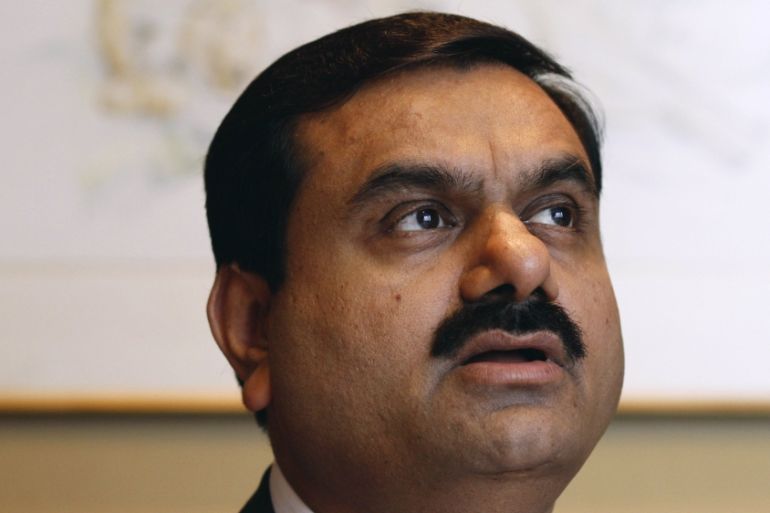India’s Adani calls off $2.5bn share sale in big setback
The group’s stocks were hammered in the past week after a US short seller raised debt and accounting concerns.

India’s Adani Enterprises has called off its $2.5bn share sale in a dramatic reversal, the company said on Wednesday, days after a rout in its stocks following criticism by a United States short seller.
The withdrawal marks a stunning setback for Gautam Adani, the school dropout-turned-billionaire whose fortunes rose rapidly in recent years in line with the stock values of his businesses.
Recommended Stories
list of 3 items- list 1 of 3Which high-street chain offers the strongest coffee?
- list 2 of 3UK documents: Bush ordered CIA to find replacement for Arafat
- list 3 of 3‘Every evening, he messaged us that he is back safe’
“…today, the market has been unprecedented, and our stock price has fluctuated over the course of the day. Given these extraordinary circumstances, the Company’s board felt that going ahead with the issue will not be morally correct,” Adani said.
“The interest of the investors is paramount and hence to insulate them from any potential financial losses, the Board has decided not to go ahead with the FPO [follow-on public offer],” the billionaire added.
“Our balance sheet is very healthy with strong cashflows and secure assets, and we have an impeccable track record of servicing our debt. This decision will not have any impact on our existing operations and future plans.”
Adani, whose business interests span ports, airports, mining, cement and power is battling to stabilise his companies and defend his reputation.
“Once the market stabilises, we will review our capital market strategy,” he said.
Shares in the billionaire’s conglomerate have plunged since the US-based short-seller, Hindenburg Research, raised debt and accounting concerns last week, driving the value of Adani’s companies $86bn lower, with the tycoon also losing his crown as Asia’s richest person.
Adani Group has denied the allegations, saying the short-seller’s allegation of stock manipulation has “no basis” and stems from an ignorance of Indian law. The group has always made the necessary regulatory disclosures, it said.
“The pain hitting Adani companies was crippling, so the news that share sale is called off is troubling, as this was supposed to show the company is still believed in by its high net-worth investors,” said Edward Moya, a New York-based senior market analyst at broker OANDA.
“To go through this exercise of a share sale and to call it off raises more questions.”
Reuters reported earlier on Wednesday, citing a person with direct knowledge, that India’s market regulator is examining the rout in the shares of Adani Group, looking into several of the allegations made by Hindenburg Research and into any potential irregularities in a share sale by Adani Enterprises.
Hindenburg had disclosed it holds short positions in Adani companies through US-traded bonds and non-Indian-traded derivative instruments.
Yields of dollar-denominated bonds issued by Adani companies rose on Wednesday after the share sale was pulled. Bond yields move inversely to prices. Yields of Adani Green Energy’s $500m bonds due in 2024 rose to 15.45 percent on Wednesday, up from 12.1 percent.
Critical fundraising
The fundraising was critical for Adani, not just because it would have helped cut his group’s debt, but also due to it being seen by some as a gauge of confidence as he faced the biggest business and reputational challenge of his career.
Adani Group was working with its bankers to refund the proceeds received in the secondary share sale of Adani Enterprises. Anchor investors who had supported the issue included Maybank Securities and Abu Dhabi Investment Authority.
The company aims to protect the interests of its investing community by returning the proceeds, it said.
On Tuesday, Adani Group mustered support from investors for the share sale for Adani Enterprises, in what some saw as a stamp of investor confidence at a time of crisis.
But the selloff in Adani group stocks and bonds resumed on Wednesday, with shares in Adani Enterprises plunging 28 percent and Adani Ports and Special Economic Zone dropping 19 percent, the worst day on record for both.
Wednesday’s stock losses saw Adani slip to 15th on the Forbes rich list with an estimated net worth of $75.1bn, below rival Mukesh Ambani, the chairman of Reliance Industries, who ranks ninth with a net worth of $83.7bn.
“I do not know how the markets will behave in short term. But this is a measure to enhance [Adani’s] reputation since the investors were staring at a 30 percent loss even before the shares were allotted,” said Rajesh Baheti, chief executive of Crosseas Capital Services, an algo-trading firm.